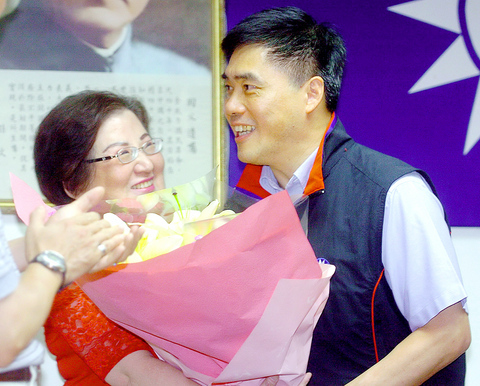The Chinese Nationalist Party (KMT) chose Hau Lung-bin (郝龍斌) as its candidate for the Taipei mayoral election yesterday, with Hau winning a 60 percent support rate from party members and Taipei residents in the party's primary.
Hau, a former Environmental Protection Administration chief, won the primary with an overall 59.68 percent rate of support. His rival, KMT Legislator Ting Shou-chung (
The winner was decided through a telephone survey and a vote among members, with the survey accounting for 70 percent of the final outcome and voting making up 30 percent. The party conducted a random telephone poll from May 21 to May 23, followed by a vote by members yesterday.

PHOTO: LIAO CHEN-HUEI, TAIPEI TIMES
Ting, however, won the most support among party members, attracting 10,730 votes yesterday compared with Hau's 6,412. The voter turnout rate was 38.7 percent. But Hau won the most support in three surveys conducted by three different polling firms, with an average 60 percent of those polled backing him, while Ting received an average support rate of 30.76 percent.
"I will continue a gentlemen's competition with my future rivals from other parties and earn residents' support with a good municipal blueprint ? We will run a clean election," Hau said at KMT headquarters after the primary result was announced.
Ting expressed regret over the result, and urged the KMT to examine its primary procedure.
"There is a big disparity between the result of the party member vote and the poll. I think it shows that it's necessary for the KMT to re-examine the primary mechanism," he said at his campaign headquarters.
Questioning the primary system's design, Ting issued a statement last night saying he would not accept the primary result.
KMT Chairman Ma Ying-jeou (
"I hope all party members will support the party's nominee whether or not they supported him before," Ma said after voting at Chin Hsin Elementary School.
Hau cast his vote with his father, former premier Hau Pei-tsun (郝柏村), while Ting accompanied former KMT chairman Lien Chan (連戰) to vote.
Kaohsiung undecided
Meanwhile in the KMT's Kaohsiung primary, former Kaohsiung deputy mayor Huang Jun-ying (黃俊英) won an average of 29 percent support, beating the seven other hopefuls. But as the party required a minimum 30 percent support rate to win the primary, the KMT will hold a second vote in 15 days to select the final candidate.
The other seven included KMT Legislator Lee Chuan-chiao (李全教), Huang Chao-shun (黃昭順), Apollo Chen (陳學聖), Lwo Shih-hsiung (羅世雄), former legislator Su Ying-kuei (蘇盈貴), former Penghu County commissioner Lai Feng-wei (賴峰偉) and former Kaohsiung City speaker Huang Chi-chuan (黃啟川).

CHAOS: Iranians took to the streets playing celebratory music after reports of Khamenei’s death on Saturday, while mourners also gathered in Tehran yesterday Iranian Supreme Leader Ayatollah Ali Khamenei was killed in a major attack on Iran launched by Israel and the US, throwing the future of the Islamic republic into doubt and raising the risk of regional instability. Iranian state television and the state-run IRNA news agency announced the 86-year-old’s death early yesterday. US President Donald Trump said it gave Iranians their “greatest chance” to “take back” their country. The announcements came after a joint US and Israeli aerial bombardment that targeted Iranian military and governmental sites. Trump said the “heavy and pinpoint bombing” would continue through the week or as long

TRUST: The KMT said it respected the US’ timing and considerations, and hoped it would continue to honor its commitments to helping Taiwan bolster its defenses and deterrence US President Donald Trump is delaying a multibillion-dollar arms sale to Taiwan to ensure his visit to Beijing is successful, a New York Times report said. The weapons sales package has stalled in the US Department of State, the report said, citing US officials it did not identify. The White House has told agencies not to push forward ahead of Trump’s meeting with Chinese President Xi Jinping (習近平), it said. The two last month held a phone call to discuss trade and geopolitical flashpoints ahead of the summit. Xi raised the Taiwan issue and urged the US to handle arms sales to

BIG SPENDERS: Foreign investors bought the most Taiwan equities since 2005, signaling confidence that an AI boom would continue to benefit chipmakers Taiwan Semiconductor Manufacturing Co’s (TSMC, 台積電) market capitalization swelled to US$2 trillion for the first time following a 4.25 percent rally in its American depositary receipts (ADR) overnight, putting the world’s biggest contract chipmaker sixth on the list of the world’s biggest companies by market capitalization, just behind Amazon.com Inc. The site CompaniesMarketcap.com ranked TSMC ahead of Saudi Aramco and Meta Platforms Inc. The Taiwanese company’s ADRs on Tuesday surged to US$385.75 on the New York Stock Exchange, as strong demand for artificial intelligence (AI) applications led to chip supply constraints and boost revenue growth to record-breaking levels. Each TSMC ADR represents

State-run CPC Corp, Taiwan (CPC, 台灣中油) yesterday said that it had confirmed on Saturday night with its liquefied natural gas (LNG) and crude oil suppliers that shipments are proceeding as scheduled and that domestic supplies remain unaffected. The CPC yesterday announced the gasoline and diesel prices will rise by NT$0.2 and NT$0.4 per liter, respectively, starting Monday, citing Middle East tensions and blizzards in the eastern United States. CPC also iterated it has been reducing the proportion of crude oil imports from the Middle East and diversifying its supply sources in the past few years in response to geopolitical risks, expanding